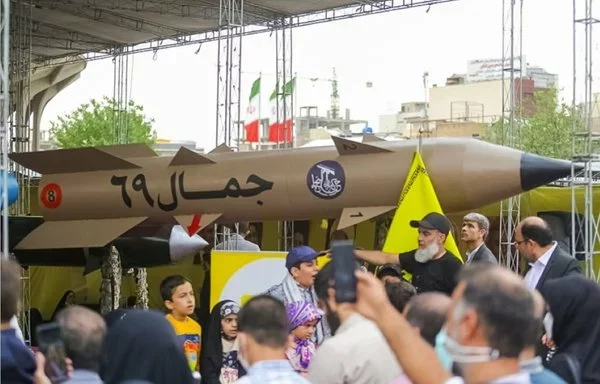Security
Militias operating in 'full coordination' with Iran openly defy Iraqi sovereignty
Iran-backed Iraqi militias are ramping up attacks on Israel despite Baghdad's objections, threatening to pull Iraq into a regional conflict.
![During a November 10 visit to Tehran, Iraqi National Security Adviser Qasim al-Araji (R) reaffirmed Iraq's refusal to permit the use of its airspace to attack neighboring countries. [Qasim al-Araji X account]](/gc1/images/2024/11/24/48177-iraq-national-security-600_384.webp)
By Anas al-Bar |
Iran-backed Iraqi militias are openly defying their own government and religious leaders while dragging Iraq deeper into regional conflict against its will.
Recent reports indicate the Islamic Revolutionary Guard Corps (IRGC) is arming its Iraqi proxies with advanced ballistic missiles and drones.
The escalation shows no signs of slowing, despite Baghdad's fierce opposition.
The so-called Islamic Resistance in Iraq, an umbrella group of Iran-aligned militias, has launched multiple attacks on targets outside the country.

It claims to have launched five drone attacks on Israel on November 14 alone.
"The Islamic Resistance has not ceased its operations targeting vital sites in the entity with highly sophisticated and capable drones," a senior official in Harakat al-Nujaba Haydar al-Lami said, in an apparent reference to Israel.
"We expect the resistance to use in the upcoming phase advanced missiles in line with the anticipated escalation," he added.
Military analyst Ayad al-Tufan told Al-Fassel these militias "insist on escalating and dragging Iraq into the war, with no intention of de-escalation."
He accused the Iranian regime of "targeting Iraq's sovereignty and national interests" through its proxy warfare.
Open defiance
Al-Lami openly proclaimed allegiance to Tehran, stating that the so-called Islamic Resistance in Iraq "is part of the resistance axis led by the Islamic Republic" and is in "full coordination with Iran."
He claimed the IRGC had "the right" to target Israel "from any location within Iraq."
Other militia leaders echoed his defiance. Harakat al-Nujaba political council head Ali al-Asadi maintained the "resistance" and people, not the state, should decide on military action.
Abbas al-Zaidi, a member of Sayed al-Shuhada's political commission, insisted that calls -- including from Grand Ayatollah Ali al-Sistani -- to place weapons under state control "do not apply to the resistance factions' weapons."
Iraqi officials roundly rejected this view, as National Security Advisor Qasim al-Araji visited Tehran to meet with IRGC chief Hossein Salami, IRGC Quds Force commander Esmail Qaani and other top Iranian officials.
"We reaffirmed Iraq's firm and principled position that rejects the use of Iraqi territory and airspace by any party to attack neighboring countries," al-Araji said on social media following the meeting.
"Iraq officially requested not to be part of the conflict," said Iraqi politician Abdul Rahman Al-Jazaery, adding that Baghdad has asked Tehran to restrain its allied militias.
Leading Shia cleric and politician Ammar al-Hakim emphasized at a November 14 news conference that Iraq is not ready to engage in a full-scale regional war.